外研版英语八上Module 5 Lao She's Teahouse.Unit 2 It descibes the changes in Chinese society. 探究导学课型课件
文档属性
| 名称 | 外研版英语八上Module 5 Lao She's Teahouse.Unit 2 It descibes the changes in Chinese society. 探究导学课型课件 | 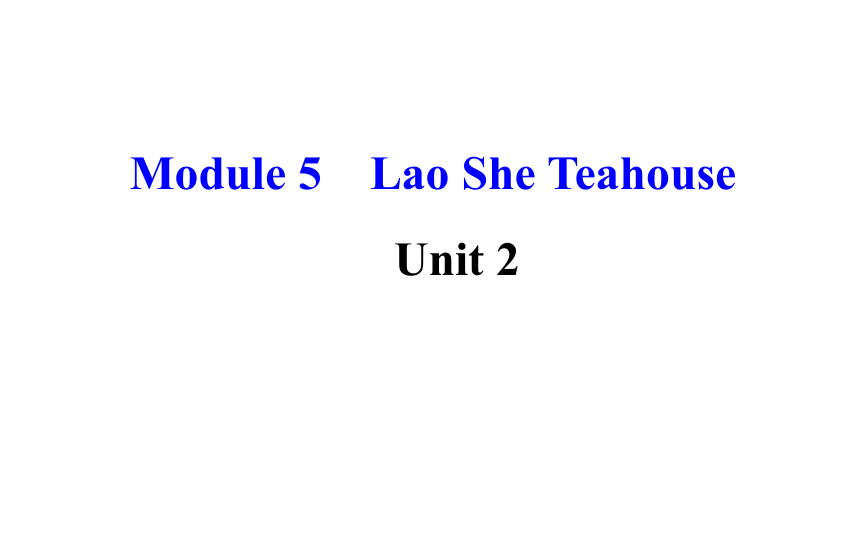 | |
| 格式 | zip | ||
| 文件大小 | 1.4MB | ||
| 资源类型 | 教案 | ||
| 版本资源 | 外研版 | ||
| 科目 | 英语 | ||
| 更新时间 | 2017-10-16 22:38:27 | ||
图片预览

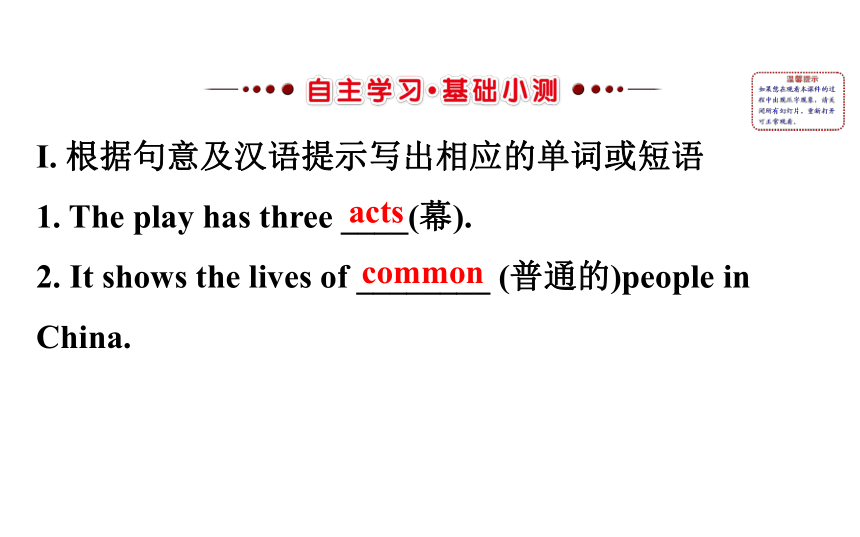
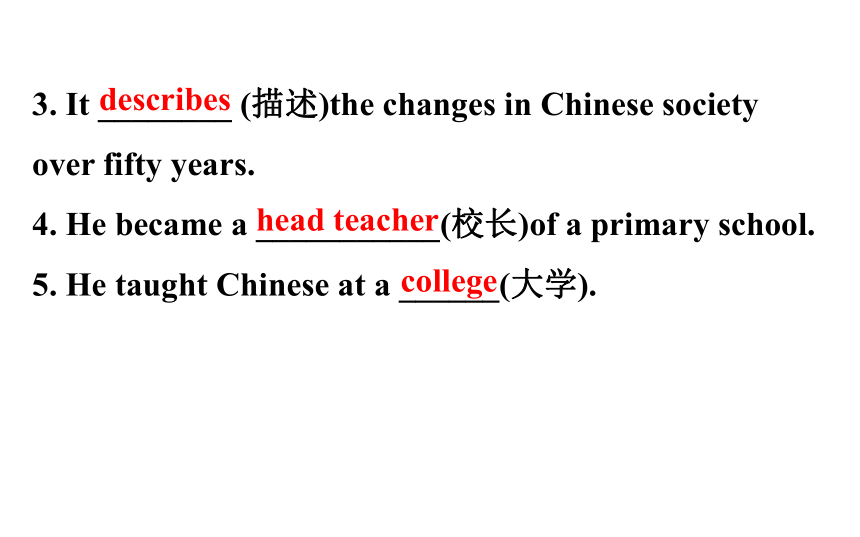
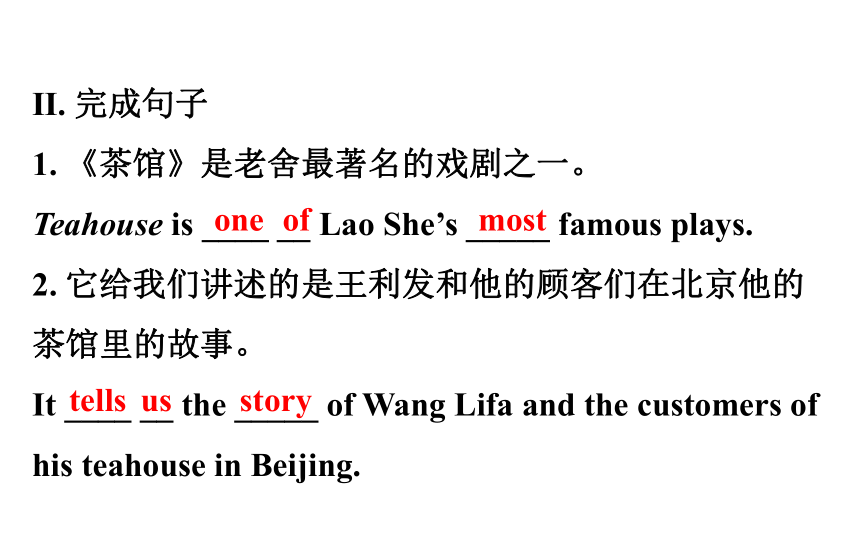
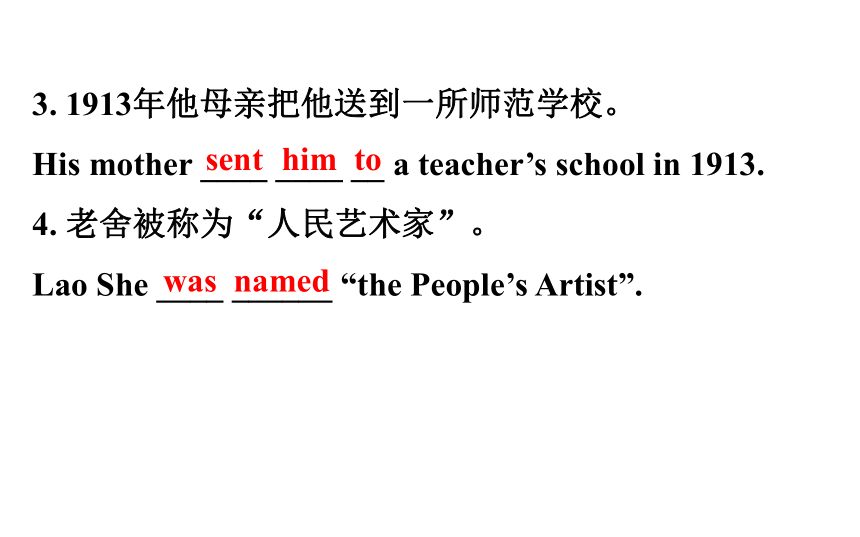
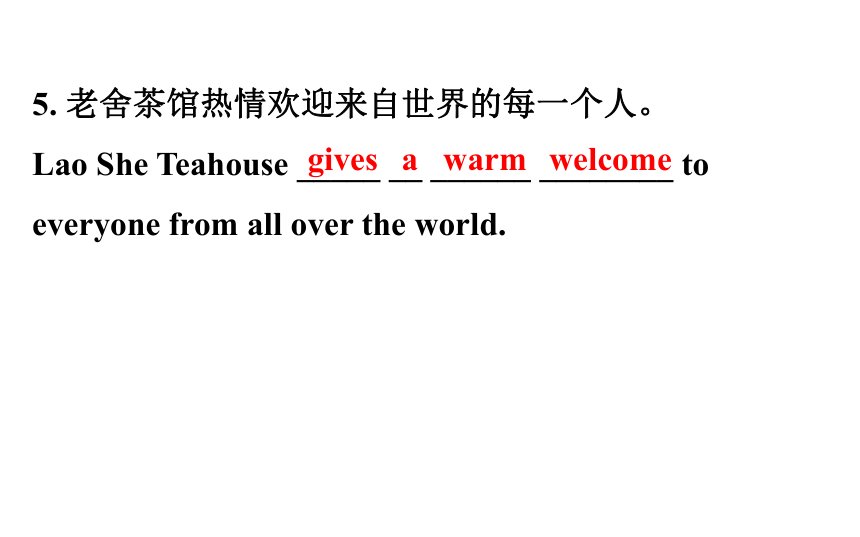
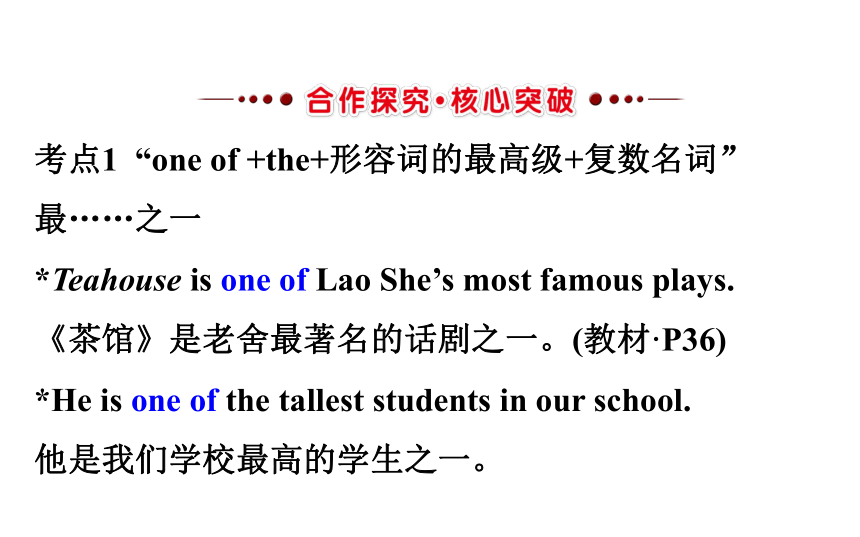
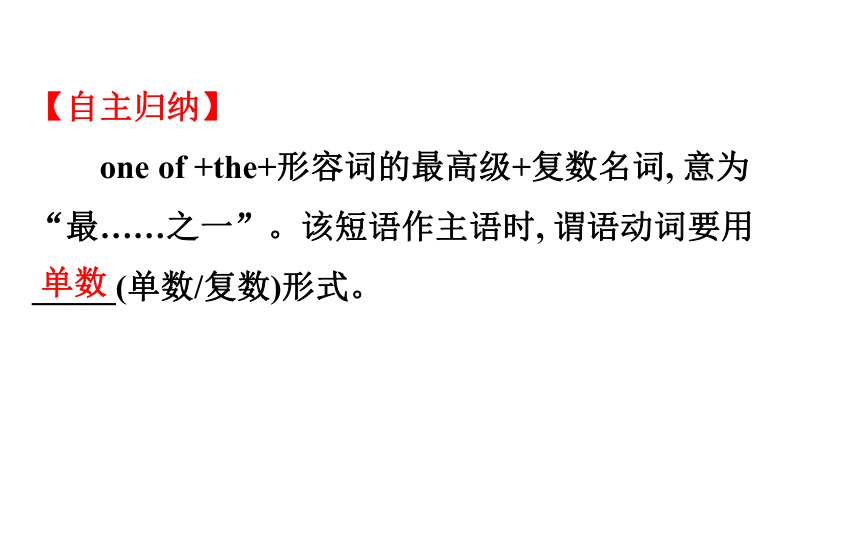
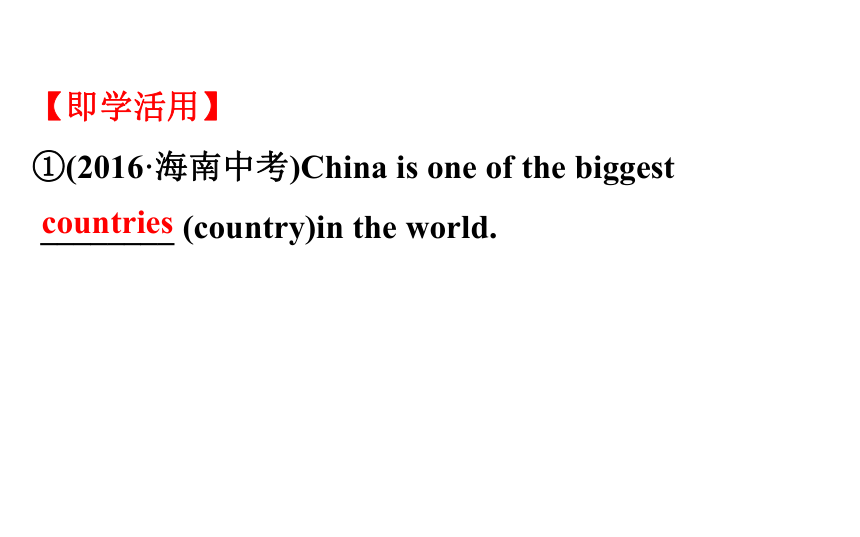
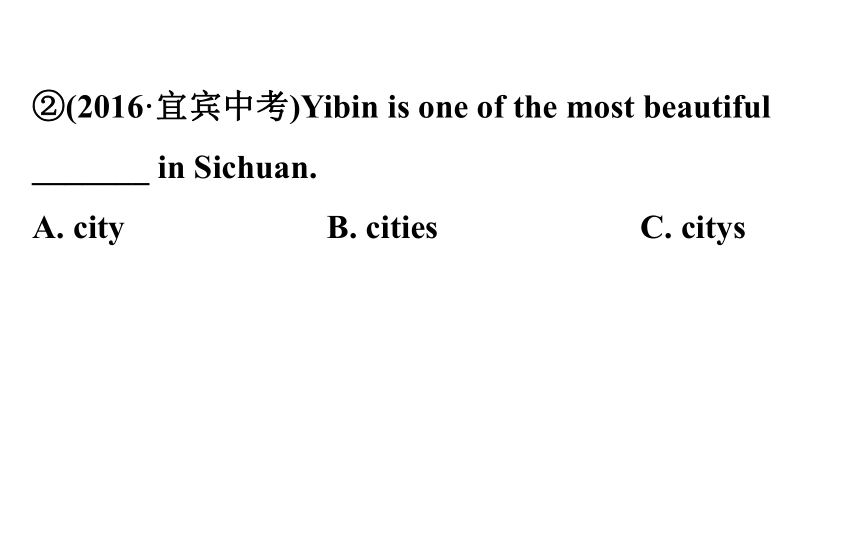
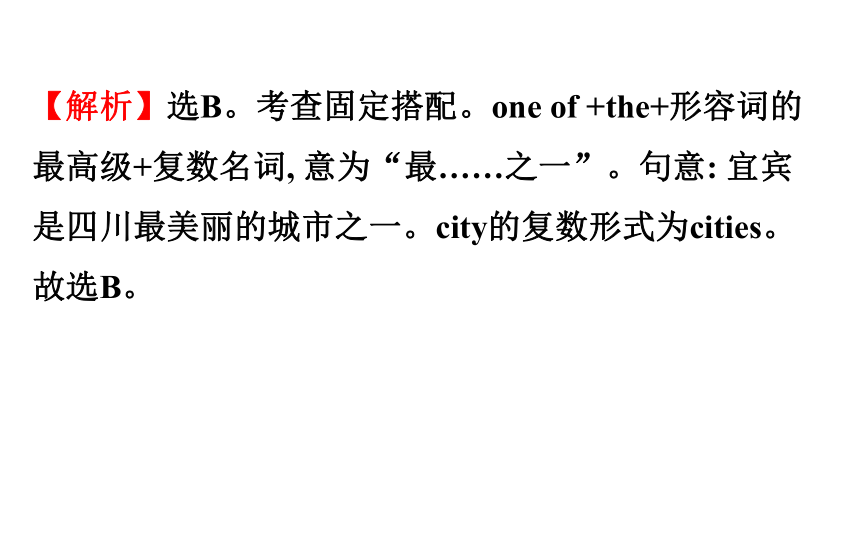
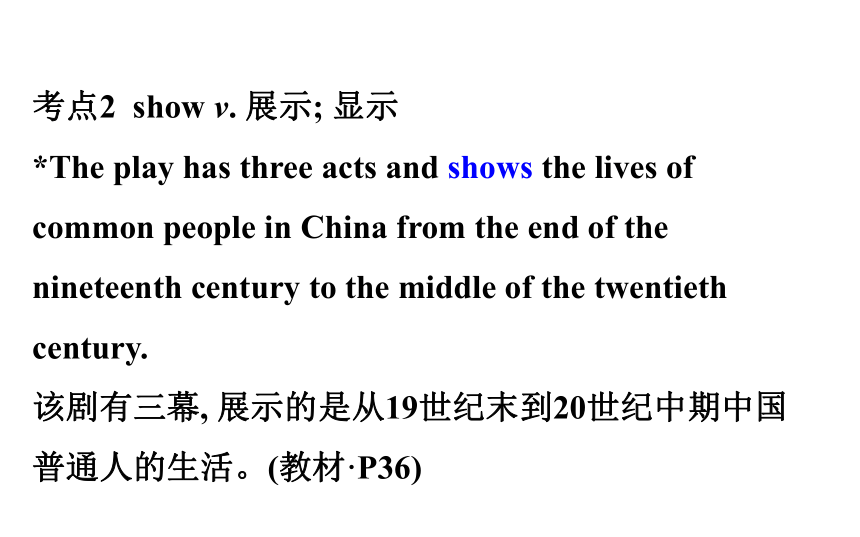
文档简介
课件31张PPT。Module 5 Lao She Teahouse
Unit 2 Ⅰ. 根据句意及汉语提示写出相应的单词或短语
1. The play has three ____(幕).
2. It shows the lives of ________ (普通的)people in
China. actscommon3. It ________ (描述)the changes in Chinese society
over fifty years.
4. He became a ___________(校长)of a primary school.
5. He taught Chinese at a ______(大学). describeshead teachercollegeⅡ. 完成句子
1. 《茶馆》是老舍最著名的戏剧之一。
Teahouse is ____ __ Lao She’s _____ famous plays.
2. 它给我们讲述的是王利发和他的顾客们在北京他的
茶馆里的故事。
It ____ __ the _____ of Wang Lifa and the customers of
his teahouse in Beijing. oneofmosttellsusstory3. 1913年他母亲把他送到一所师范学校。
His mother ____ ____ __ a teacher’s school in 1913.
4. 老舍被称为“人民艺术家”。
Lao She ____ ______ “the People’s Artist”. senthimtowasnamed5. 老舍茶馆热情欢迎来自世界的每一个人。
Lao She Teahouse _____ __ ______ ________ to
everyone from all over the world. givesawarmwelcome考点1 “one of +the+形容词的最高级+复数名词”最……之一
*Teahouse is one of Lao She’s most famous plays.
《茶馆》是老舍最著名的话剧之一。(教材·P36)
*He is one of the tallest students in our school.
他是我们学校最高的学生之一。【自主归纳】
one of +the+形容词的最高级+复数名词, 意为
“最……之一”。该短语作主语时, 谓语动词要用
_____(单数/复数)形式。单数【即学活用】
①(2016·海南中考)China is one of the biggest
________ (country)in the world. countries②(2016·宜宾中考)Yibin is one of the most beautiful _______ in Sichuan.
A. city B. cities C. citys【解析】选B。考查固定搭配。one of +the+形容词的最高级+复数名词, 意为“最……之一”。句意: 宜宾是四川最美丽的城市之一。city的复数形式为cities。故选B。考点2 show v. 展示; 显示
*The play has three acts and shows the lives of common people in China from the end of the nineteenth century to the middle of the twentieth century.
该剧有三幕, 展示的是从19世纪末到20世纪中期中国普通人的生活。(教材·P36)*Can you show me your ticket? =Can you show your ticket to me? 你能把你的票给我看看吗?
*The talk show is very popular in China.
这个脱口秀在中国很受欢迎。
*The latest computers will be on show at the exhibition.
最新型的计算机将在展览会上展出。【自主归纳】 show的用法show sth. to sb.on show【拓展延伸】
常见的双宾语结构:
give sb. sth. =give sth. to sb. 给某人某物
pass sb. sth. =pass sth. to sb. 传给某人某物
tell sb. sth. =tell sth. to sb. 告诉某人某物
bring sb. sth. =bring sth. to sb. 带给某人某物send sb. sth. =send sth. to sb. 发送给某人某物
buy sb. sth. =buy sth. for sb. 给某人买某物【即学活用】
①他在街道上将西红柿展示给顾客们。
He _______ tomatoes __ the customers in the street. showedto②(2016·天津中考)Peter will _______ you _______ the building and you can meet everyone.
A. lend; to B. show; around
C. compare; with D. brush; off【解析】选B。考查动词词组辨析。lend. . . to“借给某人”; show. . . around“带某人四处游览”; compare. . . with“和……相比较”; brush off意为“刷掉, 冷落”。句意: 彼得将带你参观这座建筑物, 你可以见每个人。故选B。考点3 send sb. to把某人送到……
*His mother sent him to a teacher’s school in 1913.
1913年他母亲把他送到一所师范学校。(教材·P36)
*They sent a teacher to that school.
他们派了一位老师去了那所学校。
*I’ll send for a doctor. 我让人去请医生来。【自主归纳】send的用法
send作动词, 意为“送; 发送”。常见固定搭配有: ①send. . . to. . . 意为“把……送到(发送给)……”; ②send for派人去请; ③send out发出; ④send away撵走。【即学活用】
①我爸爸将要把我送到我奶奶家。
My father will ____ ___ __ my grandma’s home.
②她病得很重, 我们必须给她请医生。
She was so ill that we had to ____ ___ a doctor. sendmetosendfor③(2016·陕西中考)It’s a good idea to send the old books _______ the children who need them.
A. at B. of C. to D. by【解析】选C。考查固定搭配。句意: 把旧书送给需要的孩子是一个好主意。send sth. to sb. “将某物送给某人”。故选C。考点4 teach v. 教
*He taught Chinese at a college in London and returned to China five years later. 他在伦敦一所大学里教汉语, 5年后回到了中国。(教材·P36)
*I can teach you painting. =I can teach painting to you.
我可以教你画画。*Mum teaches me to read and write, and dad teaches me how to ride a bike.
妈妈教我读书和写字, 爸爸教我如何骑自行车。【自主归纳】teach的用法
teach作动词, 意为“教”。常见短语有teach sb. sth. =teach sth. to sb. 意为“教某人某事”; teach sb. to do sth. 意为“教某人做某事”。【即学活用】
①那个穿红衣服的女士教我音乐。
The lady in red _______ ___ ______.
②这个女孩教我们唱歌, 我们都很喜欢她。
The girl _______ us __ ____ and we like her very much.
③姚期智在清华大学教计算机。
Yao Qizhi _______ __________in Tsinghua University. teachesmemusicteachestosingteachescomputers考点5 if conj. 如果
*If you like the Beijing Opera, traditional music or magic shows, you can enjoy them at the teahouse.
如果你喜欢京剧、传统音乐或魔术表演, 你可以在茶馆里欣赏到它们。(教材·P36)
*If it rains tomorrow, we won’t go to the Great Wall.
如果明天下雨, 我们就不去长城了。【自主归纳】
(1)if连词, 意为“如果, 若”时, 引导条件状语从句。如果主句的时态为一般将来时, if引导的条件状语从句要用一般现在时表示将来。
(2)if连词, 意为“是否”时, 引导宾语从句。【即学活用】
①I’ll come to see you __ (连词)I’m free tomorrow.
②__ (如果)you don’t study hard, you will not pass the
exam. ifIf
Unit 2 Ⅰ. 根据句意及汉语提示写出相应的单词或短语
1. The play has three ____(幕).
2. It shows the lives of ________ (普通的)people in
China. actscommon3. It ________ (描述)the changes in Chinese society
over fifty years.
4. He became a ___________(校长)of a primary school.
5. He taught Chinese at a ______(大学). describeshead teachercollegeⅡ. 完成句子
1. 《茶馆》是老舍最著名的戏剧之一。
Teahouse is ____ __ Lao She’s _____ famous plays.
2. 它给我们讲述的是王利发和他的顾客们在北京他的
茶馆里的故事。
It ____ __ the _____ of Wang Lifa and the customers of
his teahouse in Beijing. oneofmosttellsusstory3. 1913年他母亲把他送到一所师范学校。
His mother ____ ____ __ a teacher’s school in 1913.
4. 老舍被称为“人民艺术家”。
Lao She ____ ______ “the People’s Artist”. senthimtowasnamed5. 老舍茶馆热情欢迎来自世界的每一个人。
Lao She Teahouse _____ __ ______ ________ to
everyone from all over the world. givesawarmwelcome考点1 “one of +the+形容词的最高级+复数名词”最……之一
*Teahouse is one of Lao She’s most famous plays.
《茶馆》是老舍最著名的话剧之一。(教材·P36)
*He is one of the tallest students in our school.
他是我们学校最高的学生之一。【自主归纳】
one of +the+形容词的最高级+复数名词, 意为
“最……之一”。该短语作主语时, 谓语动词要用
_____(单数/复数)形式。单数【即学活用】
①(2016·海南中考)China is one of the biggest
________ (country)in the world. countries②(2016·宜宾中考)Yibin is one of the most beautiful _______ in Sichuan.
A. city B. cities C. citys【解析】选B。考查固定搭配。one of +the+形容词的最高级+复数名词, 意为“最……之一”。句意: 宜宾是四川最美丽的城市之一。city的复数形式为cities。故选B。考点2 show v. 展示; 显示
*The play has three acts and shows the lives of common people in China from the end of the nineteenth century to the middle of the twentieth century.
该剧有三幕, 展示的是从19世纪末到20世纪中期中国普通人的生活。(教材·P36)*Can you show me your ticket? =Can you show your ticket to me? 你能把你的票给我看看吗?
*The talk show is very popular in China.
这个脱口秀在中国很受欢迎。
*The latest computers will be on show at the exhibition.
最新型的计算机将在展览会上展出。【自主归纳】 show的用法show sth. to sb.on show【拓展延伸】
常见的双宾语结构:
give sb. sth. =give sth. to sb. 给某人某物
pass sb. sth. =pass sth. to sb. 传给某人某物
tell sb. sth. =tell sth. to sb. 告诉某人某物
bring sb. sth. =bring sth. to sb. 带给某人某物send sb. sth. =send sth. to sb. 发送给某人某物
buy sb. sth. =buy sth. for sb. 给某人买某物【即学活用】
①他在街道上将西红柿展示给顾客们。
He _______ tomatoes __ the customers in the street. showedto②(2016·天津中考)Peter will _______ you _______ the building and you can meet everyone.
A. lend; to B. show; around
C. compare; with D. brush; off【解析】选B。考查动词词组辨析。lend. . . to“借给某人”; show. . . around“带某人四处游览”; compare. . . with“和……相比较”; brush off意为“刷掉, 冷落”。句意: 彼得将带你参观这座建筑物, 你可以见每个人。故选B。考点3 send sb. to把某人送到……
*His mother sent him to a teacher’s school in 1913.
1913年他母亲把他送到一所师范学校。(教材·P36)
*They sent a teacher to that school.
他们派了一位老师去了那所学校。
*I’ll send for a doctor. 我让人去请医生来。【自主归纳】send的用法
send作动词, 意为“送; 发送”。常见固定搭配有: ①send. . . to. . . 意为“把……送到(发送给)……”; ②send for派人去请; ③send out发出; ④send away撵走。【即学活用】
①我爸爸将要把我送到我奶奶家。
My father will ____ ___ __ my grandma’s home.
②她病得很重, 我们必须给她请医生。
She was so ill that we had to ____ ___ a doctor. sendmetosendfor③(2016·陕西中考)It’s a good idea to send the old books _______ the children who need them.
A. at B. of C. to D. by【解析】选C。考查固定搭配。句意: 把旧书送给需要的孩子是一个好主意。send sth. to sb. “将某物送给某人”。故选C。考点4 teach v. 教
*He taught Chinese at a college in London and returned to China five years later. 他在伦敦一所大学里教汉语, 5年后回到了中国。(教材·P36)
*I can teach you painting. =I can teach painting to you.
我可以教你画画。*Mum teaches me to read and write, and dad teaches me how to ride a bike.
妈妈教我读书和写字, 爸爸教我如何骑自行车。【自主归纳】teach的用法
teach作动词, 意为“教”。常见短语有teach sb. sth. =teach sth. to sb. 意为“教某人某事”; teach sb. to do sth. 意为“教某人做某事”。【即学活用】
①那个穿红衣服的女士教我音乐。
The lady in red _______ ___ ______.
②这个女孩教我们唱歌, 我们都很喜欢她。
The girl _______ us __ ____ and we like her very much.
③姚期智在清华大学教计算机。
Yao Qizhi _______ __________in Tsinghua University. teachesmemusicteachestosingteachescomputers考点5 if conj. 如果
*If you like the Beijing Opera, traditional music or magic shows, you can enjoy them at the teahouse.
如果你喜欢京剧、传统音乐或魔术表演, 你可以在茶馆里欣赏到它们。(教材·P36)
*If it rains tomorrow, we won’t go to the Great Wall.
如果明天下雨, 我们就不去长城了。【自主归纳】
(1)if连词, 意为“如果, 若”时, 引导条件状语从句。如果主句的时态为一般将来时, if引导的条件状语从句要用一般现在时表示将来。
(2)if连词, 意为“是否”时, 引导宾语从句。【即学活用】
①I’ll come to see you __ (连词)I’m free tomorrow.
②__ (如果)you don’t study hard, you will not pass the
exam. ifIf
同课章节目录
- Module 1 How to learn English
- Unit 1 Let's try to speak English as much as possi
- Unit 2 You should smile at her.
- Unit 3 Language in use .
- Module 2 My home town and my country
- Unit 1 It's taller than many other buildings.
- Unit 2 Cambridge is a beautiful city in the east o
- Unit 3 Language in use .
- Module 3 Sports.
- Unit 1 Nothing is more exciting than playing tenni
- Unit 2 This year we training more carefully.
- Unit 3 Language in use .
- Module 4 Planes, ships and trains .
- Unit 1 He lives the farthest from school.
- Unit 2 What is the best way to travel.
- Unit 3 Language in use .
- Module 5 Lao She Teahouse.
- Unit 1 I wanted to see the Beijing Opera.
- Unit 2 It descibes the changes in Chinese society.
- Unit 3 Language in use .
- Module 6 Animals in danger.
- Unit 1 It allows people to get closer to them .
- Unit 2 The WWF is working hard to save them all.
- Unit 3 Language in use .
- Revision module A
- Module 7 A famous story
- Unit 1 Alice was sitting with her sister by the ri
- Unit 2 She was thinking about her cat.
- Unit 3 Language in use .
- Module 8 Accidents
- Unit 1 While the car were changing to red, a car s
- Unit 2 I was trying to pick it up when it bite me
- Unit 3 Language in use .
- Module 9 Population
- Unit 1 The population of China is about 1.37 billi
- Unit 2 Arnwick was a city with 200,000 people.
- Unit 3 Language in use .
- Module 10 The weathe
- Unit 1 It might snow.
- Unit 2 The weather is fine all year round.
- Unit 3 Language in use .
- Module 11 Way of life
- Unit 1 In China ,we open a gift later.
- Unit 2 In England, you usually drink tea with milk
- Unit 3 Language in use .
- Module 12 Help
- Unit 1 What should we do before help arrives?
- Unit 2 Stay away from windows and heavy furniture.
- Unit 3 Language in use .
- Revision module B
